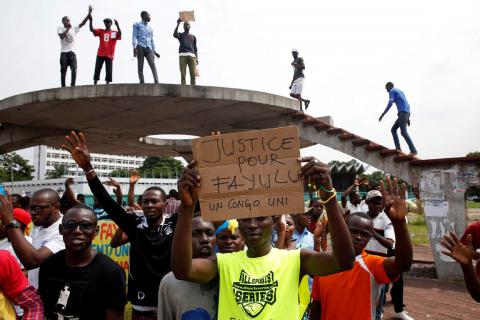Advertisement
Congo under mounting foreign pressure for vote recount
KINSHASA (Reuters) - Democratic Republic of Congo faced growing pressure from African neighbors and beyond on Monday for a recount of its contested presidential election in a dispute that threatens more violence in the volatile nation.
The Dec. 30 vote was supposed to herald Congo's first democratic transfer of power in six decades of independence and a new era after President Joseph Kabila's chaotic 18-year rule.
But monitoring groups noted widespread irregularities including faulty voting machines and poorly run polling stations, overshadowing talk of democratic progress in the vast country of 80 million people.
Second-place finisher, former Exxon Mobil executive Martin Fayulu, says he in fact won by a landslide with over 60 percent of votes and that the official winner, opposition leader Felix Tshisekedi, struck a deal with Kabila to be declared the victor.
Tshisekedi and Kabila deny this.
The International Conference of the Great Lakes Region (ICGLR), a 12-member body including Kinshasa allies Angola and Republic of Congo, expressed "great concern".
"We suggest that the competent structures consider counting the votes in order to guarantee the transparency of the results," it added in a statement.
Pressure on Kabila has built since the vote, in part because Congo's influential Catholic Church said tallies by its 40,000-strong monitoring team show a different winner to that announced by the electoral commission.
France, Belgium, the United States and Britain have all expressed concern. But perceived criticism from inside Africa could hold greater sway, with approval from regional partners critical for the legitimacy of president-elect Tshisekedi.
The CIRGL statement late on Sunday echoed the Southern African Development Community (SADC), which contains allies of Kinshasa like South Africa and Angola.
Government spokesman Lambert Mende, however, told Reuters it was up to the Constitutional Court to decide on a recount.
"It is not up to an organization, a foreign state, to tell a judge how to draw his own conclusions," he told Reuters. "Recounting the votes is a verification technique that only a judge can decide."
Fayulu has gone to the court alleging fraud and the Catholic Church has also weighed in.
"We recommend that (electoral commission) CENI recount votes to reassure all stakeholders," said Donatien N'shole, secretary general of Congo's Catholic bishops conference.
Isolated post-election violence in Congo has many fearing a return to the kind of conflict and upheaval that killed millions since the 1990s and destabilized the region.
Congo is the world's leading miner of cobalt, a mineral used in electric car batteries and mobile phones, and Africa's biggest copper producer. It also mines gold and diamonds.
(Additional reporting By Fiston Mahamba in Goma; Writing by Edward McAllister; Editing by Andrew Cawthorne)



















Add new comment